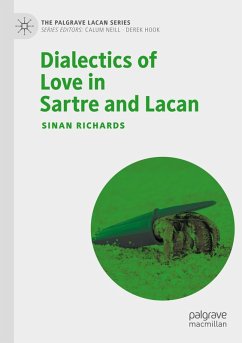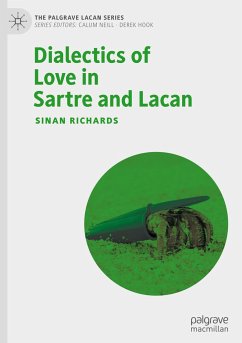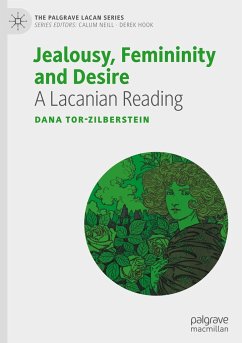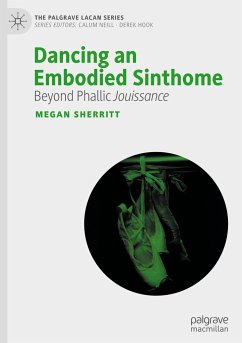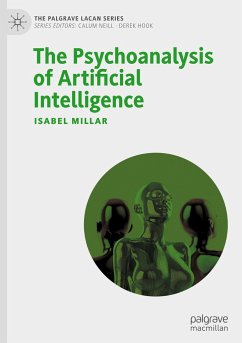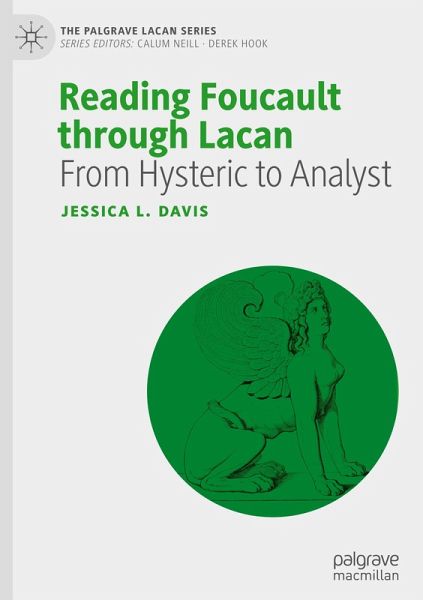
Reading Foucault Through Lacan
From Hysteric to Analyst

PAYBACK Punkte
53 °P sammeln!
Jacques Lacan and Michel Foucault are often cast as intellectual adversaries, their legacies marked by differences in method, lineages, and analytical priorities. Yet beneath their distinct projects lies a shared ambition: to decenter the Western conception of the subject while critically engaging with the notion of subjectivity in post-Kantian thought.This book examines Foucault's critical project through the lens of Lacan's theory of the four discourses, introduced in Seminar XVII: The Other Side of Psychoanalysis (1969-70). Divided into two parts, Reading Foucault through Lacan unfolds as a...
Jacques Lacan and Michel Foucault are often cast as intellectual adversaries, their legacies marked by differences in method, lineages, and analytical priorities. Yet beneath their distinct projects lies a shared ambition: to decenter the Western conception of the subject while critically engaging with the notion of subjectivity in post-Kantian thought.
This book examines Foucault's critical project through the lens of Lacan's theory of the four discourses, introduced in Seminar XVII: The Other Side of Psychoanalysis (1969-70). Divided into two parts, Reading Foucault through Lacan unfolds as a dialogue between the discourses of the Hysteric and the Analyst. Part I, "The Hysteric," reframes Foucault's genealogical critique from the early to mid-1970s as a form of hysterical questioning directed at Kant's transcendental legacy and its aftermath. Through an exploration of how violence and embodied resistance interact in a discursive framework, Part I uncovers the epistemological fractures that mark the modern subject.
Part II, "The Analyst," examines Foucault's redefinition of Kantian critique as a historically situated engagement with the present. Building on Lacan's claim that analytic experience begins with the hystericization of discourse, this section views Foucault's re-alignment with Kant as retroactively constituting the transformation from Hysteric to Analyst. Addressing themes such as parrhesia, transference, and the ethics of speaking, Part II examines discourse as a social link that transcends fixed identities to inhabit new modes of being.
Drawing on newly available English translations of Foucault's lectures and Lacan's seminars, this book bridges two key trajectories in French thought and offers valuable insights for scholars of psychoanalysis, critical theory, and social philosophy.
This book examines Foucault's critical project through the lens of Lacan's theory of the four discourses, introduced in Seminar XVII: The Other Side of Psychoanalysis (1969-70). Divided into two parts, Reading Foucault through Lacan unfolds as a dialogue between the discourses of the Hysteric and the Analyst. Part I, "The Hysteric," reframes Foucault's genealogical critique from the early to mid-1970s as a form of hysterical questioning directed at Kant's transcendental legacy and its aftermath. Through an exploration of how violence and embodied resistance interact in a discursive framework, Part I uncovers the epistemological fractures that mark the modern subject.
Part II, "The Analyst," examines Foucault's redefinition of Kantian critique as a historically situated engagement with the present. Building on Lacan's claim that analytic experience begins with the hystericization of discourse, this section views Foucault's re-alignment with Kant as retroactively constituting the transformation from Hysteric to Analyst. Addressing themes such as parrhesia, transference, and the ethics of speaking, Part II examines discourse as a social link that transcends fixed identities to inhabit new modes of being.
Drawing on newly available English translations of Foucault's lectures and Lacan's seminars, this book bridges two key trajectories in French thought and offers valuable insights for scholars of psychoanalysis, critical theory, and social philosophy.




